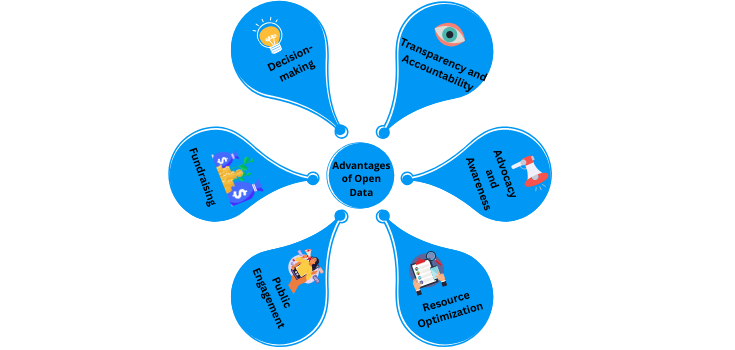In a data-driven world, information is power. Having access to relevant and reliable data is crucial for Non-governmental organizations (NGOs). In recent years, open data has created a buzz in the development sector. It has emerged as a valuable resource for NGOs. In this article, we will explore the meaning of open data, how NGOs can use it as an advantage, and the common mistakes made by NGOs while using it.
What is Open data?
Open data is unrestricted access to data that is made available to anyone who wishes to use, redistribute, or share it. This information is typically accessible online, in standardized formats, and without restrictions on its use. Here are some of the main characteristics of open data:
Accessibility: Open data should be easy to find and obtain through the internet, ensuring that anyone interested can access it.
Usability: Data should be provided in a machine-readable format, allowing users to manipulate and analyze it effectively.
Reusability: Open data should come with minimal or no restrictions on its use, allowing for various applications, analyses, and sharing.
Advantages of Open Data for NGOs
Open data in NGOs refers to the data spent by NGOs in the development sector. NGO data should ideally always be open, as real transparency means that data should be available for everyone to use and share. These data are shared by institutions, governments, CSOs, and agencies, so they are often more reliable than general open data as they come from an official source. These data can assist in achieving the Sustainable Development Goals (SDGs). Increasing transparency in the sphere of international development is a key step in improving the coordination, accountability, and effectiveness of civil society actors working in the poorest areas of the world. Transparency is important to let your supporters and donors know about your spending and organizational activities. These days, data transparency has become a part of NGO development.
Here are a few benefits of open data for NGOs:

Decision-making
NGOs rely on data to make proper decisions about their projects, strategies, and resource allocation. Open data provides a wealth of information that can help organizations better understand the communities they serve, identify critical issues and design more effective interventions.
Transparency and Accountability
Open data promotes transparency in both the public and private sectors. NGOs can use open data to hold governments and corporations accountable for their actions and policies. By making data available to the public, organizations can demonstrate their commitment to transparency and good governance.
Advocacy and Awareness
NGOs can access open data to support their advocacy efforts. Data-driven research and evidence can strengthen an organization’s case when advocating for policy changes or raising awareness about specific issues.
Resource Optimization
NGOs often have limited resources, and using them efficiently is essential. Open data can help organizations identify areas where their resources can have the most significant impact. For example, data on poverty rates, healthcare access, or education levels can inform targeted interventions.
Public Engagement
Open data can empower communities by giving them access to information about their own well-being. NGOs can use open data to engage with local communities, educate them about important issues, and involve them in decision-making processes.
Fundraising
Open data helps identify potential donors and grant opportunities. By analyzing donor’s giving patterns, NGOs can customize their fundraising strategies to match the interests of specific donors.
Using Open Data: 5 Common Mistakes Even Great NGOs Make
While open data offers numerous benefits to NGOs, there are challenges to consider, including data quality, privacy concerns, and the need for technical expertise. NGOs must ensure they have the necessary skills and resources to handle and analyze open data effectively. Sometimes, even the biggest NGO can get it wrong. Some of the common mistakes that NGOs make while using them are:
Looking at data in isolation
Using data can be very helpful, but it must always be put into context. If data is analyzed in isolation, it does not always show what we want it to show. This is why it is crucial to put data into context to make sure it can be understood.
Not drawing the correct conclusions
These two points are closely related – when data is not seen in context and all variables are not taken into account, it can lead to the wrong conclusions. Information about donors and INGOs can give some degree of information, but it always has to be put into the bigger picture. If a donor has given to an area of work in the past, this does not necessarily mean that they will do so in the future. The website still needs to be checked, and NGOs still need to network to gather further intelligence. Open data can only be one indicator of many here.
Many NGOs also confuse causation with correlation
Correlation describes a relationship between two variables, i.e., when A is high, B is also high, or when C is high, D is low. Causation means that one indicator caused the other one to be high or low. Correlation CAN mean that there is also causation, but often it does not. Researchers have shown that in huge In many huge datasets, there are correlations between many indicators, but this does not necessarily mean that there is causation. To be able to make this distinction, NGOs need to understand the indicators thoroughly beyond just looking at their value.
Not visualizing data
When data is visualized, it is much easier for the viewer or reader to process it. Designing the results of the data analysis in a visually appealing form is key to really getting the point across and can really help in formulating the conclusions of the data analysis. Reading a text with many numbers is much harder than just looking at a graph.
Not using updated data
The development sector constantly changes, so it is very important to stay up-to-date and use current data. A change in political leadership can alter the spending of a government substantially. Thus, it is crucial that NGOs try to use the most recent dataset that can be found.
Not understanding the data sources
To be able to analyze data and draw the correct conclusions, it is crucial that data users understand where the data came from.
- Is it data published by the government?
- Was it shared freely, or is it a requirement?
- Who entered the data, and what agenda might they have?
All these factors should be considered when working with open data.
The open data source or portal for NGOs
There are many open data sources. These sources facilitate access to and reuse of development information. Some of the important data portals to access open data for NGOs are listed below:
IATI provides open NGO data in a standardized manner for everyone to share, use, analyze, and work with as needed. IATI, the International Aid Transparency Initiative, aims to increase the transparency and openness of resources flowing into developing countries through an online reporting system used by governments, multilateral institutions, private sector actors, and CSOs. Many organizations that share open data only publish their datasets at the end of the year, but IATI provides real-time data, which can be much more accurate and reflect recent changes and developments. The platform is refreshed daily to reflect any new information that publishers may have uploaded.
In addition to IATI, the Organization for Economic Cooperation and Development (OECD) is also a valuable source of information relating to open data. By making public data from the government accessible to anyone, the Open Government Data (OGD) movement encourages openness, accountability, and value creation. Governments encourage the development of new businesses and cutting-edge, citizen-centric services by promoting the usage, repurposing, and free sharing of datasets.
Humanitarian Data Exchange (HDX)
Humanitarian Data Exchange (HDX) is an open platform for data exchange between organizations and situations. The purpose of HDX is to make humanitarian data accessible and useful for study. Up until now, over 250 countries and territories have accessed the datasets.
AIDA aims to unlock the potential and richness of open aid data by providing tooling for anyone (with no IT skills required). AIDA publishes open aid data, manages information, uncovers new insights, analyzes data, and visualizes trends. It is committed to guiding global organizations in their journey towards data-driven decision-making.
In accordance with the International Aid Transparency Initiative (IATI) Standard, AidStream is a method for releasing aid data. Organizations that distribute or spend resources can publish information about their development and/or humanitarian activities using AidStream.
Publish What You Fund envisions a society in which information on aid and development is open, accessible, and used for sound judgment, public accountability, and long-lasting change for all citizens. They work to ensure that all aid and development data is transparent, available, usable, and used.
The Open Data Network is dedicated to using the potential of data to enhance the environment in which we live. The network supports the development of good practices, protocols, and standards for open data. It is a key online location for research across several fields, including civic app creation, benchmarking, and best practices for open data.
World Bank Open Data provides free and open access to global development data. The World Bank is aware that accountability and openness are crucial to advancing development and fulfilling the Bank’s mandate to fight poverty. The Bank’s dedication to transparency is also motivated by a goal to promote public ownership, partnership, and participation from a variety of stakeholders in development. The World Bank’s first action as a knowledge institution is to freely and transparently share its information.
—
NGOs can unlock the potential of making more data-driven decisions and responding faster and more efficiently to change by analyzing and visualizing open data. Open data is a valuable resource for NGOs, enabling them to make data-driven decisions, enhance transparency, and collaborate with stakeholders more effectively. By harnessing the power of open data, NGOs can improve their impact and contribute to positive social change on a global scale.

